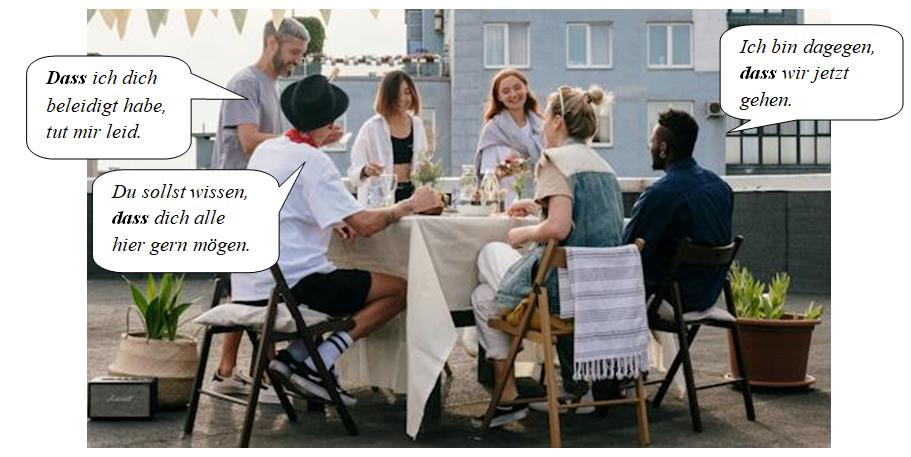CONTENTS
Dass/that
The omission of dass
Dass + another conjunctions
Infinitive clauses with zu
Dass /that
Dass is the most common conjunction used in noun clauses. It closely corresponds to the English word that.
Dass is a subordinating conjunction that introduces a dependent clause, which means that the verb must be at the end of the clause.
Dependent clauses with dass very rarely come before the main clause. If the dependent clause is placed before the main clause, it is usually intended to emphasize its content or adapt it to the overall content of both sentences.
For example:
Dass es schon ziemlich spät ist, weiß ich.
Dass du mir geschrieben hast, hat mich sehr gefreut.
In German, initial dass-clauses are more common than in English, particularly in written German. In English, we often use a noun to connect to the “that”-clause. Noun clauses function in a sentence just like nouns or noun phrases.
Dass -clauses in German most often serve as complements of a verb and are therefore referred to as complement clauses.
They can function as the:
SUBJECT: Dass sie so viel arbeitet, überascht mich.
ACCUSATIVE OBJECT: Seine Frau hat uns versichert, dass er am Wochenende zu Hause arbeitet.
GENITIVE OBJECT: Man klagt ihn an, dass er den Mord begangen hat.
PREPOSITIONAL OBJECT: Sie hat davon geträumt, dass sie ihren Urlaub in der Karibik verbringt.
PREDICATE COMPLEMENT: Tatsache ist, dass die Kinder schlechte Noten haben.
Noun clauses with dass can also depend on
- adjectives.
For example:
Ich bin froh, dass du kommen konntest. - nouns related to verbs.
For example:
Er hatte Angst, dass etwas passieren könnte. - verbs and expressions: offen, sagen, glauben, wissen, antworten, meinen, finden …
For example:
Ich hoffe, dass sie rechtzeitig kommen.
Ich glaube, dass er Mitarbeiter des Monats ist. - expressions: der Ansicht sein, der Meinung sein, ich freue mich, dass …, ich finde, dass …
For example:
Wir freuen uns, dass Sie uns bald besuchen.
Ich bin mir sicher, dass sie ihn bald heirate. - impersonal expressions with “es“: es freut mich, es ist schön, es ist wichtig, es macht mich glücklich,…
For example:
Es macht mich glücklich, dass du jeden Tag Deutsch lernst.
Es ist wichtig, dass du bald einen guten Job findest.
The omission of dass
The conjunction dass can sometimes be omitted, and the subordinate clause then has the order of a main clause, with the verb second.
For example:
Es ist sicher, dass er heute um 11 Uhr kommt.
Es ist sicher, er kommt heute um 11 Uhr.
In general, German dass is dropped less often than English that. It can be left out:
- after verbs and other expressions of saying: sagen (say), antworten (answer), berichten (report), etc., when introducing indirect speech.
For example:
Der Minister sagte, die Regierung würde neue Maßnahmen gegen Korruption ergreifen. -The minister said that the government would take new measures against corruption.
Die Polizei berichtete, die Straße sei gesperrt. – The police reported that the road was closed. - after verbs and other expressions of perceiving, feeling, hoping, thinking and believing in the widest sense. The omission of dass in these contexts is rather more frequent in spoken than in written German.
( annehmen (assume), fürchten (fear), glauben (believe), hoffen (hope), meinen (think), wünschen (wish), etc., est ist besser too ( it is better))
is better)
For example:
Ich nehme an, er verliert seine Arbeit. – I assume he loses his job.
Ich befürchte, die Lage verschlechtert sich weiter. –I’m afraid the situation is getting worse.
Es ist besser, du gibst alles zu. – It’s better if you admit everything.
Dass + another conjunctions
Dass should not be followed immediately by another conjunction. However, this ordering is very common in English, with an adverbial clause following directly after “that”,
For example:
She said that if he completed the project by Friday, he could take two days off.
Mum said that if we tidied our room, we could go out tonight.
This ordering is awkward in German, and it is considered preferable to insert at least the subject of the “dass”-clause before starting a second clause, or to complete the “dass”-clause first.
For example:
Mama sagte, dass ich, wenn ich mein Zimmer aufräumen sollte, heute Abend ausgehen könnte.
Mama sagte, dass ich heute Abend ausgehen könnte, wenn ich mein Zimmer aufräumen sollte.
English-speaking learners are strongly advised to avoid this ordering, which is commonly used in English.
Infinitive clauses with zu
Often we can make an infinitive sentence with zu from dass-sentences.
It is possible:
When the subject of the main and dependent clause is the same.
For example:
dass clause: Ich hoffe, dass ich den Zug noch erreiche.
infinitive clause: Ich hoffe, den Zug noch zu erreichen.
When the subject of the main clause is the same as the object of the dependent clause.
For example: subjekt objekt
dass clause: Er bat mich, dass ich ihn anrufe.
infinitive clause: Er bat mich, ihn anzurufen.
Zu is placed before the infinitive, but if it is a verb with a separable prefix, then between the prefix and the infinitive.
For example:
zusehen
anzusehen
See more:



